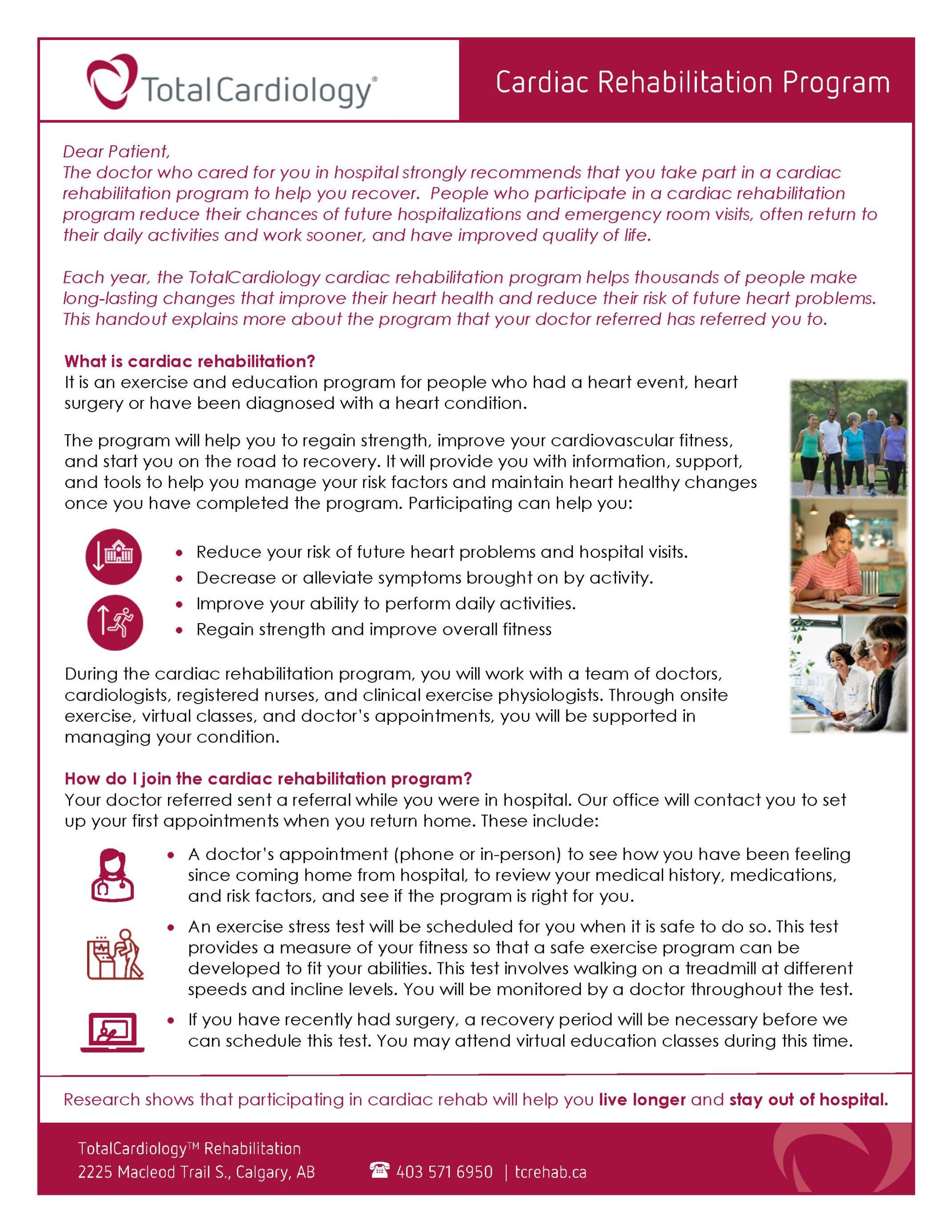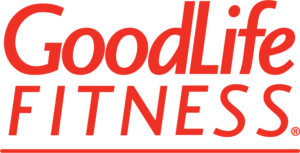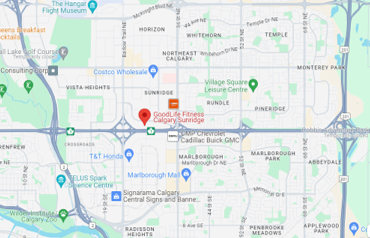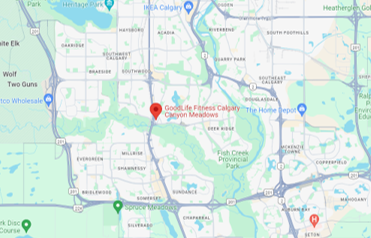We have moved! Our new clinic address is 3rd Floor, 803-1st Avenue NE. For more details, click here.
What is cardiac rehabilitation?
Cardiac rehabilitation is an important step on the road to recovery following a heart event, procedure or surgery. People who participate in a cardiac rehabilitation program reduce their chances of future heart problems and hospitalizations and improve their overall fitness so they can return to their daily activities and workplace sooner.
Our program provides information and support to help individuals manage symptoms, medications and risk factors more effectively. The program includes:
- Doctor’s appointments and exercise stress tests
- Exercise sessions held at three locations in the community
- Virtual education and group sessions
More information about how to prepare for appointments, exercise session locations and educational resources can be found by scrolling down this page. For a program overview program, click here.
Preparing for Your Appointment
Appointment Location
Your initial appointment with our program and your exercise stress test appointments will take place at our Bridgeland location – 3rd Floor, 803-1st Avenue NE.
You may be scheduled for follow-up appointment(s) and these may be booked at different locations.
Always check your appointment reminder for location information or call our clinic at 403-571-6950 If you are unsure.
Exercise sessions are run out of three community GoodLife locations. Please refer to the next session for more information.
What to bring to your appointments
✔ Alberta Health Card + government-issued photo ID
✔ If English is a second language, please bring a translator with you.
✔ A list of your medications - including the name of the medication, how often you take it, and the amount you take.
How to prepare for your exercise stress test
An exercise stress test will be scheduled for you when it is safe to do so. If you have recently had surgery, a recovery period is needed before we can schedule this appointment.
An exercise stress test tells us how your heart works during physical activity so that a safe exercise program can be developed to fit your abilities.
Please read the exercise stress test instructions a few days before your appointment.
What to wear to your exercise stress test
Please come dressed and ready for your appointment. Wear loose fitting clothing, comfortable, closed-toe running shoes and socks. Please note that the test cannot be done in flip flops, sandals, high heels, workboots or dress shoes.
Resources and Education
During the program, you will complete a series of virtual education classes – a new topic each week. Printed versions of materials and phone options for classes are available those without computer or internet access. These classes cover four key topics – medications, exercise, nutrition and stress – as they relate to heart health. Links for the classes will be emailed to you once you join the program.
An online library with digital and video resources is available to support you in making heart healthy lifestyle changes during your time in the program.
Frequently Asked Questions
TotalCardiology Rehabilitation offers a variety of programs:
Cardiac Rehabilitation Program
A 12-week exercise and education program for those recovering from a heart event, heart surgery or living with a heart condition. The program helps participants gain confidence in activity and exercise after returning home from the hospital. Participants will be followed by a team of exercise physiologists and registered nurses during their time in the program. They will provide participants with the information, tools and support necessary to manage symptoms, medications, and risk factors more effectively.
An exercise program will be developed based on your abilities and medical history to help you safely improve your physical and cardiovascular fitness. These may include walking, running, biking, stretching and more – whatever you can do and are comfortable doing.
Participants will receive information on heart healthy lifestyle changes and personalized support for safe and effective exercise. An online resource library with digital and video materials has been developed to support participants. Printed versions of these materials are provided to those without computer or internet access.
Risk Factor Management
We offer exercise programming and risk factor management to other groups of patients with chronic conditions, including those with medically-managed peripheral artery disease (non-limb threatening ischemia, ventricular assist device, postural orthostatic tachycardia syndrome (POTS) and bladder cystectomy.
A referral from your doctor, cardiologist or specialist is required for the cardiac rehabilitation program.
Individuals who want to determine their level of heart fitness and risk of developing heart disease can undergo a heart health assessment without a doctor referral. There is a fee for this service.
There is no cost for the initial doctor’s appointment to determine if the cardiac rehabilitation program is right for you. If you decide to join the cardiac rehabilitation program after this initial appointment, there is a program fee of $375 ($125 per month for three months). We have financial assistance and flexible payment options available.
The program fee for cardiac rehabilitation is not currently covered by Alberta Health Care. For some individuals, the program fee may be deducted through personal insurance coverage or covered through an extended health benefits plan (personal or spousal).
Some medical expenses not covered by provincial health care or private insurance may qualify as tax deductible medical expenses under Canada Revenue Agency legislation. For a list of tax eligible, tax-deductible medical expenses, visit the Canada Revenue Agency page on Claiming Eligible Medical Expenses on your Tax Returns.
Many people of all ages who have heart issues can benefit from a cardiac rehabilitation program. Participants who take part in our cardiac rehabilitation program often have a history of:
- Acute coronary syndrome (STEMI, NSTEMI, unstable/stable angina)
- Angioplasty
- Congenital heart disease
- Coronary artery bypass grafting (CABG)
- Valve surgery
- Heart failure
We have also adapted our program to serve additional groups of patients in managing chronic conditions, including:
- Medically-managed peripheral artery disease (non-limb threatening ischemia),
- Ventricular assist device
- Postural orthostatic tachycardia syndrome (POTS)
- Bladder cystectomy
All referred participants will have an exercise stress test to see if the the program is right for them. An exercise stress test is done by walking on a treadmill. If unable to walk on a treadmill, a bike or arm ergometer test may be done instead.
An exercise stress test provides the doctor with information about how your heart works during physical activity. The test can show whether enough blood flows to your heart when it's working hard. This helps to determine:
- Your likelihood of having coronary artery disease (CAD) or to see how serious this disease is in those who are known to have it;
- If you have any abnormal heart rhythms;
- The effectiveness of your current treatment plan – including medications and procedures like angioplasty;
- A safe and effective exercise intensity and plan.
Individuals will meet with a doctor before the test to review medical history and again after the test to review the results.
It is normal to feel nervous about starting an exercise program, especially following a heart event or surgery. Your rehab team will work with you teach you proper exercise techniques, such as warming up and stretching, and provide guidance on how to safely add in different types of activity and equipment to your routine. To ensure your exercise program is safe and effective for you, your rehab team will teach you how to monitor your intensity (or how hard you are working) during exercise and how to manage any symptoms that may arise with activity.
A support person is welcome to accompany you to all your scheduled appointments. This support person will not be able to be with you in the lab during your exercise stress test but can be present to discuss the results with you and the doctor after the test.
As of May 1st, 2024, our main clinic office is located in Bridgeland at 803-1st Avenue NE. There is a limited amount of free parking is available around the back of the building as well as free two-hour street parking on 7th Street NE.
For maps and directions, click here.
Exercise sessions are held at three community GoodLife locations - Beacon Hill, Canyon Meadows and Sunridge on varying days and times. Refer to the Exercise Location section on this page for more information.






